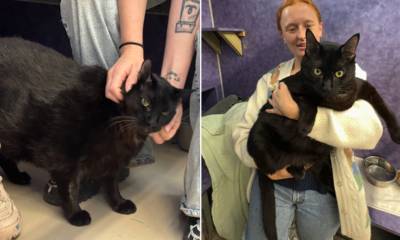Ohio
Chemical firms to pay $110 million to Ohio to settle claims over releases of ‘forever chemicals’

DOVER, Del. (AP) — The DuPont Co. and two spin-off firms will pay $110 million to the state of Ohio to settle a lawsuit over environmental threats from toxic chemicals used at a former DuPont facility in neighboring West Virginia, the companies said Wednesday.
The settlement involving DuPont, the Chemours Co. and Corteva Inc. resolves Ohio’s claims relating to releases of manmade, fluorinated compounds known as PFAS. It also resolves claims relating to the manufacture and sale of PFAS-containing products and claims related to firefighting foam containing PFAS.
The compounds, which are associated with an increased risk of certain cancers and other health problems, are often referred to as “forever chemicals” because of their longevity in the environment. They have been used in the production of nonstick coatings such as Teflon, firefighting foam, water- and stain-resistant textiles, food packaging and many other household and personal items.
According to the companies, Ohio will allocate 80% of the settlement to the restoration of natural resources related to the operation of the Washington Works facility near Parkersburg, West Virginia, on the eastern shore of the Ohio River. The other 20% will be used to address PFAS claims statewide, including the use of firefighting foam. The settlement is subject to court approval.
Under a 2021 agreement with the state of Delaware, the Ohio settlement means the companies also are obligated to pay $25 million to Delaware for environmental initiatives. As part of the 2021 settlement, the companies agreed to pay $50 million to Delaware and to fund up to an additional $25 million if they settled similar claims with other states for more than $50 million.
Ohio began litigation against DuPont and Chemours in February 2018 regarding historical emissions of perfluorooctanoic acid, known as PFOA, from the Washington Works site. PFOA was once widely used in a variety of products, including nonstick cookware. Ohio alleged damage to natural resources from the use of the compound, and impropriety in the 2015 spinoff by DuPont that created Chemours.
DuPont will contribute about $39 million to the settlement. Chemours, the former performance chemicals unit of DuPont, will pay about $55 million, with the rest owed by Corteva. Chemours was spun off as a stand-alone company in 2015. Corteva, the former agriculture division of DowDuPont, became a separate company in 2019.
Under a 2021 cost-sharing arrangement that resolved legal disputes over PFAS liabilities arising out of pre-2015 conduct, DuPont and Corteva, on one hand, and Chemours, on the other, agreed to a 50-50 split of certain expenses incurred over a term of up to 20 years, or an aggregate $4 billion.
DuPont began using PFOA in products at the Washington Works facility in the 1950s. Chemical releases from the site have been blamed for a variety of health problems among local residents and have resulted in multiple lawsuits.
In April, the U.S. Environmental Protection Agency ordered Chemours to address PFAS pollution in stormwater and effluent from the Washington Works facility. The EPA said it was the first Clean Water Act enforcement action to hold polluters accountable for discharging PFAS into the environment.
According to the EPA, PFAS levels in the discharges from Washington Works have exceeded levels set in the facility’s Clean Water Act permit.

Ohio
Lawmaker takes action after Ohio Supreme Court rules 'boneless' chicken wings can have bones

COLUMBUS, Ohio — The Ohio Supreme Court ruled that a man who ordered boneless wings should have expected bones to be in them, denying him a jury trial after he suffered major injuries, including several surgeries and two medically induced comas. A state legislator is so outraged by the decision that he plans to propose a bill to change the law.
State Sen. Bill DeMora (D-Columbus) is an avid wing fan, having weekly wing nights with his friends when he was in college. Just recently, he went to an all-you-can-eat boneless wings event.
“I did not expect to have a bone in my boneless wings,” DeMora said.
But that isn’t how the state sees it.
Chicken wings advertised as ‘boneless’ can have bones, Ohio Supreme Court decides
The case
Back in 2017, Michael Berkheimer ordered boneless wings at Wings on Brookwood in Southwest Ohio, according to his lawsuit filed in Butler County. The menu of the restaurant was included the court documents and did not feature any disclaimer saying bone fragments could be in the food. As of Friday, it still doesn’t.
He had cut up his wing into thirds, eating the first two pieces of it normally. On his third one, Berkheimer felt like something went down the wrong “pipe,” the court documents said. He ran to the restroom and tried to vomit, unsuccessfully. That night, he developed a fever, and for the next two days, he couldn’t eat a bite of food without throwing up, records state.
He was rushed to the ER with a 105-degree fever, the lawsuit states. Doctors found a 1 and 3/8 inch chicken bone in his throat, one that tore open the wall of his esophagus. From there, he developed a “massive infection in his thoracic cavity,” the document says.
“The severity of the infection, which centered on Mr. Berkheimer’s heart and lungs, required several surgeries, two medically induced comas, and a week-long stay in intensive care, followed by two-to-three additional weeks in the hospital,” the lawsuit states.
The medical issues are still ongoing, records state.
Berkheimer sued the restaurant and their chicken suppliers, arguing that the sellers’ “negligence” led to his injuries.
Both the Butler County Court of Common Pleas and the Twelfth District Court of Appeals sided against Berkheimer, arguing that “common sense dictated the presence of bone fragments in meat dishes,” according to the courts. Neither court let the case go to trial.
Supreme Court
On Thursday, the majority of the Ohio Supreme Court ruled that the lower courts made the right decision, denying Berkheimer the ability to continue his lawsuit to a jury trial. The court was split four Republicans to three Democrats.
The justices were just supposed to decide whether or not it could go to trial, Case Western Reserve University law professor Jonathan Entin said.
“The majority said no way this case shouldn’t go to trial at all because no reasonable consumer would think that boneless chicken wings might not have bones in them, especially since bones are part of chickens,” Entin explained.
The court didn’t believe a jury would rule in Berkheimer’s favor, he said.
In the majority opinion, Justice Joe Deters wrote that the restaurant wasn’t liable “when the consumer could have reasonably expected and guarded against the presence of the injurious substance in the food.”
Deters added that “boneless wings” are a cooking style, according to the opinion. He compared “boneless wings” to the food “chicken fingers,” noting that people would not actually think they are eating fingers.
The courts used the ‘Allen test’ method to determine negligence, which evaluates both if the harmful substance was foreign to the food or natural and whether the customer could reasonably guard against it. They found that the bone was natural and large in comparison to the piece of chicken.
“Any reasonable consumer should have been able to find it,” Entin said, explaining the court’s opinion.
The Democrats emphatically dissented.
“The result in this case is another nail in the coffin of the American jury system,” dissenting opinion author Justice Michael Donnelly said.
The case is merely about whether Berkheimer can have a jury of his peers decide if the restaurant and suppliers were negligent according to law, he said.
“The majority opinion makes a factual determination to ensure that a jury does not have a chance to apply something the majority opinion lacks— common sense,” the justice continued.
He continued on to explain that they didn’t have the full facts, being unable to see what the bone looked like.
“If it did, then I suggest that the majority suffers from a serious, perhaps disingenuous, lack of perspective,” the justice said.
The idea that the label “boneless wing” is a cooking style is “Jabberwocky,” the Democrat said, saying the absurdity of the opinion reads like a “Lewis Carroll piece of fiction.”
This could have ripple effects, Donnelly argued. For people who are nut, dairy or gluten-free, the court seemed to have decided that if they order allergy-free food, it could still have the allergen because that is “natural” to the food.
Deters responded to this, claiming it was different.
“But unlike the presence of the bone in this case, the presence of lactose or gluten in a food that was advertised as lactose-free or gluten-free is not something a consumer would customarily expect and be able to guard against,” Deters said.
It’s a lot harder to detect gluten or lactose than it is to detect a bone, Entin explained.
Reaction
This is insane, DeMora said.
“This defies logic, it defies reason, it defies common sense,” DeMora said. “Now the definition of boneless, according to the Ohio Supreme Court, means… it could have a bone.”
The justices are blocking Berkheimer from having a jury trial because they don’t care about the “regular Ohioan,” he said.
“You get screwed out of your day in court because we have to protect our donors and our corporations more than we protect our citizens,” the lawmaker said.
DeMora has already directed his team to start looking into what they can do to help Berkheimer and other Ohioans.
“We can’t really pass a law saying that boneless chicken means there’s no bones in it — Although maybe we can, I don’t know. If that’s possible, I’m gonna do it for sure.”
Regardless of that idea, he is also researching other consumer protection provisions he can draft bills around, he said.
Berkheimer’s attorney, Robb Stokar, agreed that this case wasn’t fair.
“I believe the dissent correctly wrote that the ruling was “another nail in the coffin of the American jury system.” Mr. Berkheimer suffered catastrophic injuries from a bone contained in a menu item unambiguously advertised as “boneless” at every level of commerce. All we asked is that a jury be able to make a commonsense determination as to whether he should be able to recover for his injuries. But the Court’s majority ruled otherwise, simultaneously denying him that opportunity, and rendering the word “boneless” completely meaningless,” Stokar told me.
Some of these justices are up for reelection, so Entin anticipates some politicos could put ads up about this decision — especially because Deters’ tone did not need to be as harsh as it was.
“You don’t have to get into all of the technical details of legal doctrine to be able to say this is a decision that shows that a majority of the current court are not sympathetic to ordinary people who get hurt through, basically, no fault of their own,” Entin said.
Deters, Donnelly and dissenting Justice Melody Stewart are all up for election in November.
“Boneless means without bones,” DeMora said. “I can’t understand the logic of the Republican majority.”
Follow WEWS statehouse reporter Morgan Trau on Twitter and Facebook.
Ohio
Democratic Ohio Sen. Sherrod Brown loses police endorsement for the first time in 12 years

COLUMBUS, Ohio — For the first time since his Senate career began, Sherrod Brown has failed to earn the Ohio Fraternal Order of Police’s endorsement for re-election — and the union cites the Democrat’s tweet about a controversial shooting.
The Ohio FOP in 2006 endorsed then-Sen. and now-Gov. Mike DeWine, the Republican who lost his seat to Brown in an upset.
Since then, Brown has won the support of law enforcement, deftly navigating the blue-dog politics of an ever-reddening state. But not this year.
“It came down to a tweet,” said Mike Weinman, Ohio FOP spokesman and a retired officer who was paralyzed in the line of duty. “There was a shooting here, and Sherrod, instead of taking time to listen and talk to us and understand the situation, did what all these people do now and got on his phone. Brown made a comment. It’s a shame.”
The incident Weinman refers to dates back to 2021, when Columbus cop Nicholas Reardon fatally shot 16-year-old foster child Ma’Khia Bryant after responding to a domestic-violence call. He arrived at the scene to find Bryant swinging a knife at another young child in the home.
“When he arrived it was complete chaos,” Weinman told The Post. “She was using a weapon on an unarmed person so he had to unfortunately use his service weapon to neutralize the scene. Nobody in that house including the officer is happy that happened, let me tell you. But Brown spoke out quickly against the officer, and a lot of people I think remembered that during the vote.”
The senator tweeted one day after the April 21, 2021, shooting and tied it to another event that day: a former Minneapolis cop’s conviction for killing George Floyd.
“While the verdict was being read in the Derek Chauvin trial, Columbus police shot and killed a sixteen-year-old girl. Her name was Ma’Khia Bryant. She should be alive right now,” Brown wrote.
Bryant’s death also sparked Black Lives Matter protests — she was black, Reardon is white.
But the officer was cleared of wrongdoing, with a grand jury declining to charge him after a review found the shooting justified.
Weinman also says further “statements” from the senator about police may have cost him more votes.
“People here genuinely don’t know where he stands on things like George Floyd and qualified immunity. Our voters know their stuff, and he just wasn’t being clear enough about where he stands. Brown has always been great for supplies, vests, helping us get resources. But I think now our people aren’t as sure they can trust him,” he told The Post.
Weinman explained the endorsement process: An FOP committee screens a small batch of candidates for office. The approved candidates are then brought up for a floor vote.
“They called his name, and it was time,” Weinman said. “He missed it by four votes.”
Brown’s Republican opponent, Bernie Moreno, won’t receive the FOP endorsement this year either, but Weinman says this has more to do with procedure than politics.
“In the past, if a candidate failed to get the votes on the floor, a member could make a motion to suggest a new name, and we could have an immediate, direct vote,” Weinman said. “This year we changed that. Only names from the screening committee could be voted on, and only Brown made it past them.”
The committee passed on Moreno due to his lack of political experience.
“He’s too new,” Weinman said. “Great businessman, potential for sure. But he has to prove it. Like Vance did.”
By this, Weinman is referring to a similar vote in 2018 when then-Senate candidate J.D. Vance was able to win the prized endorsement over more experienced competitors.
“Vance really worked for it. He campaigned. Moreno ran out of time,” Weinman said.
He also confirmed the Ohio FOP will not be making any additional statewide endorsements for 2024.
Brown is the only prominent Democrat left in the soon-to-be-solid-red Ohio, making his race with Moreno one of the most expensive and closely watched in the nation.
Brown maintains a 6.5-point lead over Moreno, but experts expect endorsements like this one and Vance’s emerging role as a national campaigner to have a significant effect on the Buckeye State.
Ohio
A missing 12-year-old Georgia girl is found in Ohio after her community galvanized to locate her

ATLANTA — A 12-year-old girl whose disappearance galvanized a Georgia community has been found in Ohio.
Hall County Sheriff Gerald Couch said Friday that Maria Gomez-Perez was found Thursday in Dover, about 70 miles (110 kilometers) south of Cleveland, in the company of a Guatemalan man who is now jailed.
“I come to you with some very great news,” Couch told reporters in a news conference. “Maria Gomez-Perez has been safe in Dover, Ohio, and she should be on her way home here to Gainesville with our investigators within the hour.”
Gomez-Perez was last seen at the home of her father, Andres Gomez, on May 29 in Gainesville, about 50 miles (80 kilometers) northeast of Atlanta. She was reported missing a day later.
Her disappearance sparked a huge search, with local authorities and businesses offering a $20,000 reward. Volunteers canvassed the community looking for the girl and papered the area with posters, flyers and even billboards seeking the girl’s return.
Couch said investigators found Gomez-Perez had been communicating online with men, expressing unhappiness and saying she wanted to leave home. He said investigators believe Antonio Augustin drove to Georgia, picked up Gomez-Perez, and drove her back to Augustin’s home in Dover. While Couch said Augustin is 31 years old, Ohio jail records list him as 34.
“Let me be very clear on this: Maria is the victim in this case,” Couch said. “And remember, she’s 12 years old.”
Couch said investigators began to home in on Gomez-Perez’s location when she contacted her father using a new Facebook account last week, telling her father that she was OK and not coming home, and asking her father to stop looking for her. Couch said investigators used that message to track down the Facebook page’s internet address, leading them to a phone number associated with a home in Dover.
Four sheriff’s investigators traveled to Ohio this week and spotted Gomez-Perez at a city swimming pool, later arresting Augustin and recovering Gomez-Perez. Couch said Gomez-Perez was examined by medical personnel.
Tuscarawas County jail records show Augustin is being held on a rape charge. Jail records don’t list an attorney who can speak for him and officials with the Tuscarawas County Sheriff’s Office didn’t immediately return a phone call and an email seeking comment.
Couch said Georgia authorities will also be seeking criminal charges against Augustin.
Officials in Georgia had faced initial criticism in the search for Gomez-Perez, in part because the Georgia Bureau of Investigation concluded that her disappearance didn’t meet the criteria for issuing an Amber Alert for missing children. Many residents in the Gainesville area are Hispanic, coming to the city to work in its poultry processing industry, but most officials are not of Hispanic descent, which can create divides.
“It’s hard to put into words what we saw. I just really, really am proud of our community,” Gainesville Mayor Sam Couvillon told The Times of Gainesville on Friday. “Our Hispanic community just really stood up and made their presence known and said, ‘Hey look, let’s shine a light on this missing child.’”
Couch concluded his remarks with a warning to parents to watch their children’s online activity.
“Technology is a wonderful thing. It helped us locate Maria. But technology can also be used for evil. It’s why Maria was able to leave Gainesville with a stranger and travel nine hours away from home,” Couch said. “So please know what your children are doing and who they’re communicating with. They’re our most vulnerable and our most valuable citizens and it is our duty to take care of them.”
-

 World1 week ago
World1 week agoOne dead after car crashes into restaurant in Paris
-

 Midwest1 week ago
Midwest1 week agoMichigan rep posts video response to Stephen Colbert's joke about his RNC speech: 'Touché'
-

 News1 week ago
News1 week agoVideo: Young Republicans on Why Their Party Isn’t Reaching Gen Z (And What They Can Do About It)
-

 Movie Reviews1 week ago
Movie Reviews1 week agoMovie Review: A new generation drives into the storm in rousing ‘Twisters’
-

 Politics1 week ago
Politics1 week agoFox News Politics: The Call is Coming from Inside the House
-

 News1 week ago
News1 week agoVideo: J.D. Vance Accepts Vice-Presidential Nomination
-

 World1 week ago
World1 week agoTrump to take RNC stage for first speech since assassination attempt
-

 News1 week ago
News1 week agoRNC speakers want to separate the president from the person to show softer side of Trump

















